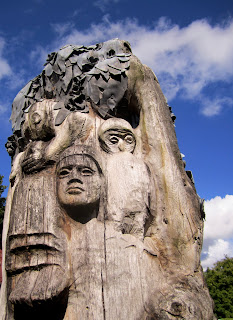Second Thoughts
| Gospel | Matthew 21:28-32 |
|---|
Matthew certainly has it in for the church-goers. His bitterness expressed through the tax collectors and prostitutes that were occupying the seats of honour before the priests and elders. The fact that at the time they were expelling the followers of Jesus from the Temple may well have had something to do with it; do you think?
But if Jesus was gathering his followers from the prostitutes and tax collectors of the city then surely, after his death, they have got no nearer the Temple courtyards - they are as excluded as they have ever been - the priests meant Jesus' message to be squashed by his crucifixion - the undesireable as undesireable as ever.
Matthew is talking about about a whole two tier set of Christians; those that believed in the Good News but were still acceptable in polite company and those that believed and were never and would never be allowed anywhere near polite company.The thought the Temple would ever accept them showing a very human desire to be accepted. At some point the break was bound to happen. The Good News falls differently on ears that believe they have the answer than on ears that have nothing but questions. But how hard to admit that we are the use-less rather than the use-ful ones. Yet God loves the use-less ones; the ones who are not filled with their own strategies for life are more likely to have time for God's.
It seems easier, more worldly, to become 'yes' people - people pleasers - measuring ourselves by the approval of others. And then, believing that the 'yes' is good enough, feeling justified by our projected image of obedience.
Obedience is not about what we say but what, or who, we listen to. We can react with a barely considered and bound to fail 'yes' or we can use the 'no' that says I'm not worthy until the Spirit reminds us us that 'worthy' is not the measure of a Christian, All Jesus wants to know is 'Do you believe in Love? Do you desire God's Love? Then Love.' Whoever we are.
wordinthehand2011




Comments
m+x
submit himself to his Superior in all obedience,
imitating the Lord, of whom the Apostle says,
"He became obedient even unto death."
It may not be easy to be obedient to the Church, especially when we see things happening that might irk us or that we really have to struggle with. But I believe obedience brings with it a freedom. It is not that I don't make myself responsible for my actions, but, in following Christ and His Church, I being what God wants me to be. It might not make me popular, but in the end, it will make me happy.
Benedict's rule is a rule of doing and being; hospitality and a great sense of humility. Sometimes what the Church leads us towards seems to be a place of elitism and exclusion - then I wonder 'what would Jesus do'?